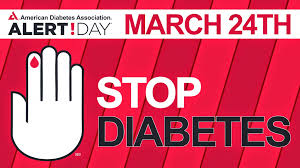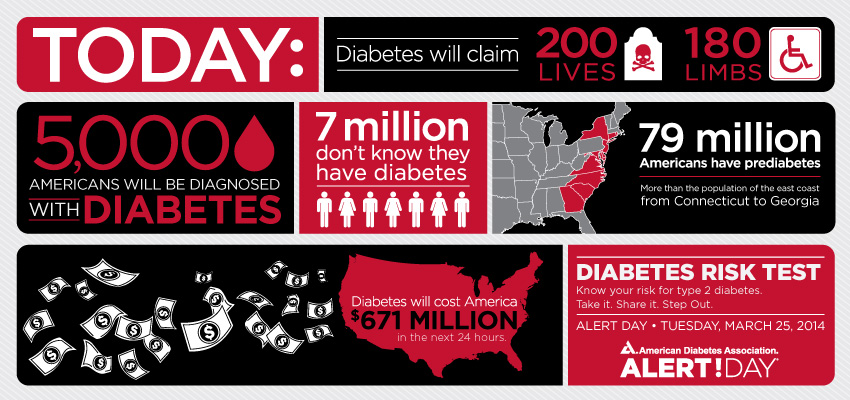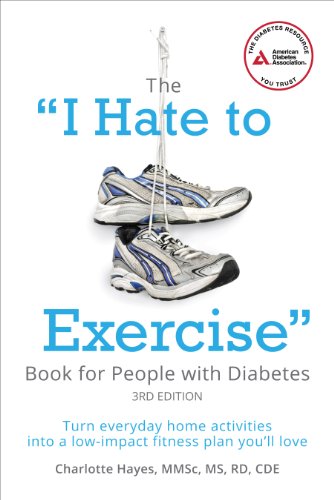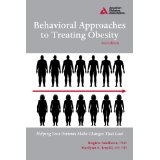Let’s Act NOW to Slow the Type 2 Diabetes Pandemic

Consider these staggering stats that capture the worldwide prediabetes and diabetes epidemic:
Diabetes Alert Day 2015 - At Risk? Take Action NOW!
 Tuesday March 24, 2015 is the American Diabetes Association's (ADA) annual Diabetes Alert Day. This day kicks-off a four-week campaign which runs through April 21, 2015.
Tuesday March 24, 2015 is the American Diabetes Association's (ADA) annual Diabetes Alert Day. This day kicks-off a four-week campaign which runs through April 21, 2015.
Diabetes Alert Day is THE day each year that ADA sets aside to alert the public to the Diabetes Risk Test. If the results of your risk test indicates you'r at risk, take the next step to know for sure. The goal is for you or your loved one to TAKE ACTION to get diagnosed and care for prediabetes or type 2 diabetes.
I wholeheartedly support this effort. The time for action is now!
The statistics about the prediabetes and type 2 diabetes epidemics are alarming enough to sound the alarm 365 days a year. They show the dent diabetes is making and will continue to make on our health care system, let alone peoples’ lives and longevity!
According to CDC's Diabetes Facts:
- 29 million children and adults are living with diabetes. (This includes about 6 million people who currently have diabetes but have not yet been diagnosed.) Based on the current U.S. population, about 314 million people - roughly 9.5%.
- 86 million people are estimated to have prediabetes placing them at a much greater risk for developing type 2 diabetes. CDC estimates that’s about 35% of all adults over the age of 20 and 51% of adults over 65 years of age (yes, you read that correctly!). Research from CDC shows, unfortunately, that barely 11% of these people know they have it.
- One in three American adults will have diabetes in 2050.
THE TRUTHS about Keeping Pounds at Bay
 Losing weight is one tough challenge, but not as tough, research shows, as keeping those lost pounds at bay over time. What are the THE TRUTHS about keeping lost pounds at bay?
Losing weight is one tough challenge, but not as tough, research shows, as keeping those lost pounds at bay over time. What are the THE TRUTHS about keeping lost pounds at bay?
Research shows that the most weight most people, on average, lose, even with pretty constant expert support, is about 6 to 10% from your starting weight. Example: 200 pounds that's 12 to 20 pounds. For sure, some people lose more (but do they keep the weight off?). Losing this 6 to 10% of weight hardly seems worth it compared to those triple digit losses touted by the Biggest Loser TV show or some weight loss plans.
Research also shows people lose these 12 to 20 pounds by about the 6 months to 1 year point of their effort. It’s simply tough to lose more weight. Read Weight Loss, Control: Expectations vs. Research-based Realities.
Diabetes Alert Day 2014 - Help Me Sound the Alarm Louder
 Tuesday March 25, 2014 is the American Diabetes Association's Diabetes Alert Day. Though the statistics about the prediabetes and type 2 diabetes epidemics are alarming enough to sound the alarm 365 days a year, Diabetes Alert Day is THE day each year that the American Diabetes Association sets aside to encourage people to TAKE the Risk Test and if need be, TAKE ACTION to diagnose and care for prediabetes or type 2 diabetes NOW. I fully support this effort!
Tuesday March 25, 2014 is the American Diabetes Association's Diabetes Alert Day. Though the statistics about the prediabetes and type 2 diabetes epidemics are alarming enough to sound the alarm 365 days a year, Diabetes Alert Day is THE day each year that the American Diabetes Association sets aside to encourage people to TAKE the Risk Test and if need be, TAKE ACTION to diagnose and care for prediabetes or type 2 diabetes NOW. I fully support this effort!
Yes, the stats are downright scary and clearly show the dent diabetes is and will continue to make in our health care system, let alone peoples’ individual lives and livelihood!
Interview with Susan Weiner, co-author The Complete Diabetes Organizer
Diabetes, whether type 1 or 2, is a personally very demanding disease. That’s an understatement! The day-to-day management of diabetes is done by the beholder and/or their caregivers, not the person’s healthcare provider(s). As healthcare providers we spend time teaching people about managing diabetes, from medications to food, exercise, preventing complications and more. It would be great if we had endless time to help give people practical ideas and strategies for fitting their diabetes into everyday life, but we generally and unfortunately, don’t.
That’s THE BIG reason I’m pleased to see this new book come along, The Complete Diabetes Organizer. This all-in-one guidebook, written by diabetes nutrition educator, Susan Weiner and organization guru, Leslie Josel, offers up plenty of practical tips, products, apps and more to help people with diabetes better organize their diabetes into their real (and busy) lives.
Book Review: I Hate to Exercise Book for People with Diabetes
This is one in a series of book reviews. You may find these books beneficial if you: manage prediabetes or diabetes, follow a diabetes meal plan and/or try to eat healthy to live well. These book reviews also appear on amazon.com and these books can be found in my amazon a-store. This book is also available from American Diabetes Association's book store. Please check out these books and consider a purchase.
 Let’s face it: we know exercise is important, especially in managing diabetes. But sometimes it’s just hard to put exercise into practice nearly every day (as you’ve been told it should be done). Plenty of people have gotten the exercise bug and it’s ingrained in their daily lives. Other people, and you may be one, just plain hate to exercise.
Let’s face it: we know exercise is important, especially in managing diabetes. But sometimes it’s just hard to put exercise into practice nearly every day (as you’ve been told it should be done). Plenty of people have gotten the exercise bug and it’s ingrained in their daily lives. Other people, and you may be one, just plain hate to exercise.
In the 3rd edition of The “I Hate to Exercise” Book for People with Diabetes, authored by registered dietitian, certified diabetes educator and exercise specialist, Charlotte Hayes, MMSc, MS, RD, CDE, exercise detesters get an ADA published and approved resource to turn to for sneaky ways to move more.
Top 10 Take Aways from ADA 2013 – Part Two
 I recently attended the 73rd American Diabetes Association (ADA) Scientific Sessions in Chicago, June 21-25 where brilliant and dedicated researchers and health care professionals from around the globe gather to learn, share and connect. As a diabetes educator involved in the diabetes field nearly 35 years and counting, I was once again wowed by this meeting...and learned a ton!
I recently attended the 73rd American Diabetes Association (ADA) Scientific Sessions in Chicago, June 21-25 where brilliant and dedicated researchers and health care professionals from around the globe gather to learn, share and connect. As a diabetes educator involved in the diabetes field nearly 35 years and counting, I was once again wowed by this meeting...and learned a ton!
Though tough to choose, here are my top 10 take aways from the 2013 ADA meeting - divded into Part One and Part Two:
6. Delivering Improved Diabetes Care and SUPPORT Using Technology: It’s been said before and was said again and again this year, people with diabetes (and prediabetes) need ongoing and consistent support. As Marti Funnell, MS, RN, CDE said, “If we don’t address the emotional side of diabetes we won’t ever improve outcomes. It is an imperative!” And as Ed Fisher, PhD, of Peers for Progress (link) said, “Humans have fundamental need for support and social connections.” People not only need emotional support to manage this disease, but research clearly shows that to make the necessary health behavior changes and implement the management strategies for good control, people also need support. See #10 – The DOC.
The good news is today we have technologies, from Skype, to online systems, to tracking devices, telehealth tools, and more to come in the future, to incorporate important support systems. And numerous studies presented at ADA again showed that people do better with support…and that we can deliver this conveniently to people and more cost effectively.
Top 10 Take Aways from ADA 2013 – Part One
 I recently attended the 73rd American Diabetes Association (ADA) Scientific Sessions in Chicago, June 21-25 where brilliant and dedicated researchers and health care professionals from around the globe gathered to learn, share and connect. As a diabetes educator who’s been involved in the diabetes field nearly 35 years and counting, I was once again wowed by this meeting...and learned a ton!
I recently attended the 73rd American Diabetes Association (ADA) Scientific Sessions in Chicago, June 21-25 where brilliant and dedicated researchers and health care professionals from around the globe gathered to learn, share and connect. As a diabetes educator who’s been involved in the diabetes field nearly 35 years and counting, I was once again wowed by this meeting...and learned a ton!
Though tough to choose, here are my top 10 take aways from the 2013 ADA meeting - divded into Part One and Part Two:
1. DCCT/EDIC Results Heralded: A highlight of ADA was celebrating the 30 year anniversary of the landmark type 1 study, the Diabetes Control and Complications Trial. This trial was designed to answer the questions: Does good control matter? The DCCT began in 1983 and the conclusions were unveiled at the 1993 ADA meeting (I still remember the thrill of hearing the results live!). These results showed a reduction in the early stages of diabetes complications (eye, kidneys, etc.), by up to 76% compared with so-called “conventional therapy” – two shots of insulin a day.
New Diabetes Numbers – Sound the Alert LOUDER
 While we were experiencing a much ado about nothing “snow storm” in Washington, DC on March 6, 2013, hundreds of diabetes advocates were storming Capitol Hill for a cause we should be doing much about.
While we were experiencing a much ado about nothing “snow storm” in Washington, DC on March 6, 2013, hundreds of diabetes advocates were storming Capitol Hill for a cause we should be doing much about.
To kick off their advocacy day the American Diabetes Association’s (ADA) released findings from a report they commissioned, Economic Costs of Diabetes in the U.S. in 2012, at a press conference. Joining ADA leaders at the press event were Ann Albright, PhD, RD, director of CDC’s Division of Diabetes Translation, Judith Fradkin, MD, director of the National Institutes of Health’s division which encompasses diabetes (NIDDK) and several key members of the Congressional Diabetes Caucus, Senator Susan Collins (R-ME) and Senator Jean Shaheen (D-NH) (who has a granddaughter with type 1 diabetes I learned at AADE's advocacy day in 2012).
The stats presented by ADA are downright scary! It is, without a doubt, time to sound the alert about our prediabetes and type 2 diabetes epidemics louder and louder.
Check out a few key stats.* Read through these slowly and repeatedly, it takes a few readings to absorb their impact!
Book Review: Behavioral Approaches to Treating Obesity: Helping Your Patients Make Changes That Last
This is one in a series of book reviews. You may find these books beneficial if you: manage prediabetes or diabetes, follow a diabetes meal plan and/or try to eat healthy to live well. These book reviews also appear on amazon.com and the books can be found in my amazon a-store. Please check them out and consider a purchase.
Note: This book is geared to healthcare providers who help people make behavior changes. I’ve recently reviewed a similar book for healthcare providers Inspiring and Supporting Behavior Change: A Food and Nutrition Professional’s Counseling Guide.
 No longer is it unusual to hear the term ‘obesity’ in our culture. While studies and books abound on the topic, Behavioral Approaches to Treating Obesity, Helping Your Patients Make Changes That Last, by experts Brigitta Adolfsson, PhD and Marilynn S. Arnold, MS, RD, have created an all-in-one resource and reference guide for healthcare providers (HCPs).
No longer is it unusual to hear the term ‘obesity’ in our culture. While studies and books abound on the topic, Behavioral Approaches to Treating Obesity, Helping Your Patients Make Changes That Last, by experts Brigitta Adolfsson, PhD and Marilynn S. Arnold, MS, RD, have created an all-in-one resource and reference guide for healthcare providers (HCPs).
Behavioral Approaches to Treating Obesity begins with an in depth overview of the dismal statistics about obesity in America. The authors proceed to cover the multi-factorial nature of weight gain. They also discuss the possible ‘solutions’ for obesity which include bariatric surgery, obesity medications and/or healthy lifestyle changes.
Adolfsson and Arnold invite HCPs to view obesity from a different perspective…being open to every and all treatment modalities. In utilizing behavior change techniques for healthy lifestyle changes people make the decisions while the HCP interacts in a manner that supports the person’s well-being.

